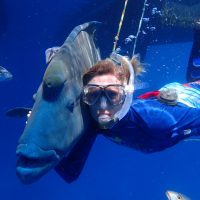Johanna Leonhardt
PhD candidate
James Cook University
johanna.leonhardt@my.jcu.edu.au

From 2005 to 2022, the main node of the ARC Centre of Excellence for Coral Reef Studies was headquartered at James Cook University in Townsville, Queensland (Australia)








As a passionate conservationist and an ocean-lover, a career in marine biology was an easy choice! Attending a University on the surf coast of Victoria, Australia, I had the unique opportunity to study a B.Sc and gain a greater respect and love for the ocean through surfing and marine activities. However my marine conservation efforts didn’t start until I travelled up to Far North Queensland in 2010, where I decided to go back to uni to study a Masters in Conservation and Management at James Cook University. This gave me the opportunity to visit the beautiful Great Barrier Reef through diving and snorkelling on many sites along the coast (from Port Douglas to to Gladstone), both recreationally and for research.
My love of animals lead me to focus my research on marine turtle health for a few years, where I gained knowledge and inspiration from my fellow researchers and teachers – the up-close experiences I’ve had with these marine reptiles, including a research expedition to Raine Island, have been some of the best moments of my academic life.
Currently, I am focusing on coral health, including their resilience and ability to grow and reproduce after a major disturbance. I am also looking at the current interspecific relationship some species of coral have with algal-farming damselfish, and if this relationship will impact the future survival and persistence of the Great Barrier Reef. I have also been given the opportunity to work in the tourism industry on a weekly basis, travelling out on daily tours, educating people from all around the world about the ecological and physiological elements of a coral reef system, including the very apparent threats to the reef and current conservation efforts made by other researchers at JCU and other affiliates.
I have been given this unique opportunity to spread awareness and make people think about their future actions (however seemingly small) and how it may affect such a beautiful ecosystem whilst being involved in research and conservation on the GBR.
“Success is the good fortune that comes from aspiration, desperation, perspiration and inspiration.”
~ Evan Esar
New DNA techniques are being used to understand how coral reacted to the end of the last ice age in order to better predict how they will cope with current changes to the climate. James Cook Univer
A new study on the effects of climate change in five tropical countries has found fisheries are in more trouble than agriculture, and poor people are in the most danger. Distinguished Profess
James Cook University researchers have found brightly coloured fish are becoming increasingly rare as coral declines, with the phenomenon likely to get worse in the future. Christopher Hemingson, a
Researchers working with stakeholders in the Great Barrier Reef region have come up with ideas on how groups responsible for looking after the reef can operate more effectively when the next bleaching
Abstract: As marine species adapt to climate change, their heat tolerance will likely be under strong selection. Individual variation in heat tolerance and its heritability underpin the potential fo
Abstract: The Reef Ecology Lab in KAUST’s Red Sea Research Center explores many aspects of movement ecology of marine organisms, ranging from adult migrations to intergenerational larval dispersal
Abstract: Macroalgal meadows are a prominent, yet often maligned component of the tropical seascape. Our work at Ningaloo reef in WA demonstrate that canopy forming macroalgae provide habitat for ad
Abstract: Sharks are generally perceived as strong and fearsome animals. With fossils dating back at least 420 million years, sharks are not only majestic top predators but they also outlived dinosa
Abstract: Connectivity plays a vital role in many ecosystems through its effects on fundamental ecological and evolutionary processes. Its consequences for populations and metapopulations have been
Abstract: Evolution of many eukaryotic organisms is affected by interactions with microbes. Microbial symbioses can ultimately reflect host’s diet, habitat range, and even body shape. However, how
Abstract: The past few years have seen unprecedented coral bleaching and mortality on the Great Barrier Reef (GBR) but the consequences of this on biodiversity are not yet known. This talk will expl